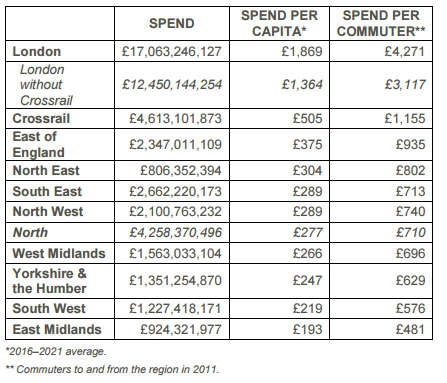The North receives six times less investment in infrastructure than London, a spending gap that should be addressed with a ‘North first’ investment policy from the new Government, according to analysis from a leading economic think tank.
IPPR found that the North will get average £280 per person compared with London’s £1,870, based on outlined Government spending plans for transport infrastructure between 2016/17 and 2020/2021.
The think tank highlighted that the total spend on Crossrail alone will be £4.6bn during this period, exceeding spending on all projects in the North (£4.3bn), and has written to transport secretary Chris Grayling to call for a change of policy.

Table from IPPR
With per capita analysis based on 2011 commuter figures, IPPR found that England's North East will see £304 per person, the North West £289, Yorkshire & Humber £247, and London £1,869, for key infrastructure between 2016/17 and 2020/21.
However, in other regions to gap gets even worse with the East Midlands coming last in England for just £193 and the South West on £219.
Ed Cox, director of IPPR North, said: ‘To build Theresa May’s "Better Britain", we must focus on a better North. The North of England’s £300bn economy is worth more than those of Scotland, Wales and Northern Ireland combined.
'Focussing on this is going to be critical in creating the prosperity our country is going to need over the coming years.'
Mr Cox went on to call for more financial devolution, arguing that the North must ‘take control of its own funding decisions' as ‘local decision-making is closely linked to growth rates’.
IPPR highlighted that ‘if we could only halve the output gap between the North and the national average then the economy would be £34bn better off’.
This is combined with stark criticism of central government economic analysis. The IPPR stated that there is ‘strong emerging evidence that the way the Treasury calculates the economic “return” on infrastructure investment is seriously flawed’.
Mr Cox described HM Treasury’s modelling as ‘outdated and ineffective’ and ‘better suited to mitigating congestion than driving new economic growth’.
‘New ways of assessing the benefits of transport schemes, and devolving 10-year budgets, will make for much more effective long-term planning,’ IPPR stated.
This is one of several recommendations IPPR made to Government. Other calls included:
- Using record-low interest rates to raise £50bn 'catch-up cash' to invest in northern road and rail priorities
- Work to be brought urgently forward on the so-called 'HS3' (east-west crossing) – even if this means taking priority over HS2 (north-south)
- Ensuring the passage of the Buses Bill through Parliament
- Introducing a new Clean Air Act for major cities to tackle toxic air, which kills 40,000 people a year and costs the NHS and the wider economy more than £20bn a year
Register now for full access
Register just once to get unrestricted, real-time coverage of the issues and challenges facing UK transport and highways engineers.
Full website content includes the latest news, exclusive commentary from leading industry figures and detailed topical analysis of the highways, transportation, environment and place-shaping sectors.
Use the link below to register your details for full, free access.
Already a registered? Login